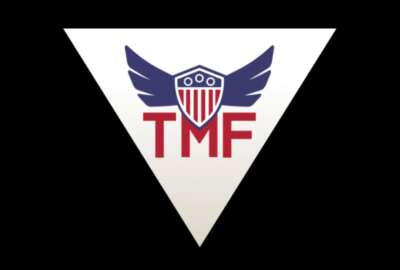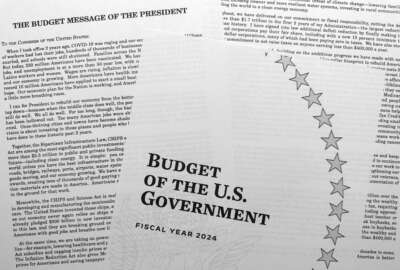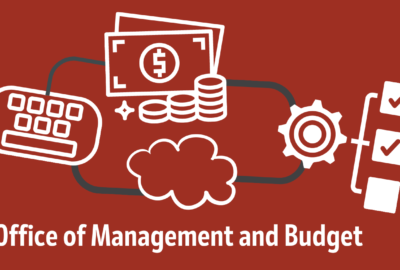Hubbard Radio Washington DC, LLC. All rights reserved. This website is not intended for users located within the European Economic Area.
On Air: Federal News Network
Trending:
Senate to take $100M back from TMF, $10M from USDS
The 2024 spending bill cuts all federal IT modernization funds, including the TMF, the Federal Citizen Services and the IT Oversight and Reform accounts.
The Senate got its pound of flesh from the Technology Modernization Fund after all.
Despite the efforts by industry and the Office of Management and Budget over the last six plus months to change the committee’s mind, Senate appropriators rescinded $100 million from the TMF for fiscal 2024.
Senate lawmakers released the remaining 2024 appropriations bill today that detailed the decisions to reduce funding for centralized IT modernization accounts across the board.
The TMF is taking a double hit as the Senate also zeroed out any new funding for this year, possibly leaving the IT modernization effort in a tough spot from a funding perspective.

“The draconian zeroing out and rescinding of these vital funds will only jeopardize the health and safety of veterans, first responders and families that rely on government services every day. We have got to stop treating government IT as a luxury,” said Rep. Gerry Connolly (D-Va.), ranking member of the Oversight and Accountability Subcommittee on cybersecurity, IT and government innovation, in a statement to Federal News Network. “The TMF is not a slush fund to be raided when budget negotiations get tough. It is a vital part of the federal government’s technology infrastructure and it plays an indispensable role in ensuring government agencies are functioning at their best on behalf of the American people we serve. I am deeply disappointed in the decision to slash this funding, but I will not stop fighting until our government has the resources it needs to keep up with 21st Century technological demands.”
On the bright side, however, the Senate only rescinded $100 million instead of the $290 million it initially wanted to pull back from the $1 billion the TMF received under the American Rescue Plan Act.
It’s unclear how much of the $1 billion the TMF received from the American Rescue Plan Act remains. President Joe Biden’s fiscal 2025 budget request shows about $790 million left in the TMF that is unobligated for 2024, but that also includes money awarded to agencies, but not yet sent out the door.
“The rescission, although less than what was in the Senate bill, is disappointing and damages the U.S. government’s ability to strengthen its cybersecurity and modernize its IT systems,” said a spokesman for Sen. Jerry Moran (R-Kansas), in an email to Federal News Network. “Sen. Moran will continue to be a leader for this program and work to ensure that this program is funded next year to get our agencies back on track.”
An email to OMB seeking comment was not immediately returned.
TMF cuts are ‘pound foolish’
Since Congress created the TMF in the Modernizing Government Technology Act in 2018, the board has received $1.2 billion in funding from Congress and handed out $800 million to 51 investments across 29 agencies. The board says 40 of those investments are from ARP funding, but it didn’t say how much money it spent from that $1 billion investment.
The Biden administration requested $200 million for the TMF in its 2024 budget request. The TMF board received $50 million in 2023 from Congress. For fiscal 2025, the White House is asking for $75 million for the TMF.
Kevin Cummins, the former staff member lead in the Senate on the MGT Act, which authorized and advocated for funding the TMF through the ARPA, and now a partner with the Franklin Square Group, said the Senate’s decision is a pennywise and a pound foolish.
“Even worse than the dollar amount is the loss of Congressional support for the TMF this rescission represents. The idea for the TMF was proposed by President [Barack] Obama, implemented by President [Donald] Trump, and finally given a major funding infusion under President Biden. The TMF has always been supposed to be more than just an alternative funding mechanism. It is a better way to fund IT initiatives in the modern, cloud computing era,” Cummins said. “As a working capital fund, the TMF allows agencies to invest in IT and software upgrades more flexibly and closer to the way private companies undertake IT modernization, rather than the increasingly uncertain annual appropriations process.”
OMB recently updated the repayment expectations for agencies receiving TMF money, in part because of pressure from lawmakers, who have been unhappy with the administration’s decision in 2022 to change the repayment requirements.
TMF repayment options changed
An OMB spokesperson said in February that the updated TMF repayment policy will apply to all proposals submitted on and after Feb. 6.
“This policy will establish a consistent repayment floor of 50%, enabling the fund to invest in critical IT and cybersecurity modernization for years to come. Under rare exceptions, the GSA Administrator and OMB Director can approve a repayment rate lower than 50%,” the spokesperson said. “As the TMF Board allocates the last of the ARP funding, we are looking to the future of the TMF in a post-ARP setting – balancing congressional intent and agency flexibility to deliver the most impact for the American people.”
Julie Dunne, a former House Oversight and Accountability staff member and now a principal with the Monument Advocacy leading the federal procurement team, said given outside forces pushing on the budget, it’s not surprising the lawmakers ended up pulling the money back.
“In 2023, we had a $1.5 trillion deficit so it’s not surprising that appropriators went looking for recessions from the 2021 American Rescue Plan (ARP). There is no doubt that the need for IT modernization in the federal government ecosystem remains and transitioning away from legacy IT was part of the original vision when I worked on the Modernizing Government Technology Act, which established the TMF,” she said. “I think the adjustment of TMF repayment terms after receiving the $1 billion under the ARP was a mistake and based on the 2024 outcome it appears that there may have been a failure of advocacy to make the case on the importance of the TMF and the success stories.”
To some experts, the rescission also signals the continued struggle of OMB to explain to Congress the true impact of TMF.
Mike Hettinger, a former House staff member and now president of Hettinger Strategy Group, said the Senate’s decision is not surprising.
“What this tells me is that congress still needs more proof from GSA that the projects funded by TMF are having the desired impact, despite progress from the TMF PMO in recent months on this front,” he said. “The TMF remains a vital tool in the IT modernization funding toolbox and everyone involved needs to continue to work to get it right. There’s clearly more work to be done.”
Other IT funds also cut
In addition to the TMF, Senate appropriators also rescinded $10 million from the U.S. Digital Service through the IT Oversight and Reform (ITOR) fund and reduced the Federal Citizen Services Fund, run by the General Services Administration, to $75 million in 2024 from $90 million in 2023.
The bill, however, includes $8 million for the ITOR fund in 2024, which is $6 million less than the administration requested and $6 million less than what Congress appropriated in 2023.
Lawmakers also are adding additional oversight to the citizen services fund. The bill includes a provision requiring GSA to “submit a spending plan and explanation for each project to be undertaken to the committees on appropriations of the House of Representatives and the Senate not later than 60 days after the date of enactment of this act.”
“On the cuts to the Federal Citizen Services Fund, it’s a similar story,” Hettinger said. “Again, this tells me Congress is not yet fully bought in on how these funds are being used.”
One positive outcome of the 2024 spending bill came for the Treasury Department. After asking for permission to set up an IT working capital fund under the MGT Act authority, Congress granted the request.
The bill lets Treasury keep up to 5% of any unobligated appropriation for IT modernization efforts. Treasury’s discretionary budget for 2024 is $287.5 million for salaries and expenses.
Now there are three agencies with specific IT working capital funds authorized under the MGT Act. Treasury joins the Small Business Administration and the Office of Personnel Management in gaining this authority.
Additionally, GSA received $4 million for federal rulemaking modernization from its working capital fund.
Copyright © 2024 Federal News Network. All rights reserved. This website is not intended for users located within the European Economic Area.
Jason Miller
Jason Miller is executive editor of Federal News Network and directs news coverage on the people, policy and programs of the federal government.
Follow @jmillerWFED
Related Stories
Related Topics
Agency Oversight
All News
Budget
Congress
Federal Citizen Services Fund
General Services Administration
Gerry Connolly
IT Modernization
IT Oversight and Reform Fund
IT working capital fund
Julie Dunne
Kevin Cummins
Management
Mike Hettinger
Office of Management and Budget
Senate Appropriations Committee
Technology
technology modernization fund
Treasury Department






